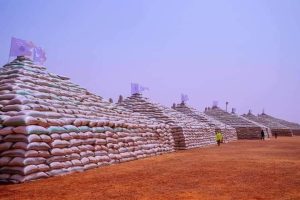In 2022, Nigeria unveils the world’s largest rice pyramid. Today, Nigerians are unable to afford rice
On Jan. 18, 2022, ex-president Muhammadu Buhari unveiled the world’s largest rice pyramid in a bid to increase local rice production and cheaper rice for Nigerians.
Speaking during the launch, Buhari said the pyramids marked the beginning of lower rice costs in the market.
“I am aware that the bags of paddy will be moving straight from here to rice milling plants across Nigeria, which leads to the release of processed rice to the markets by the rice millers. The measure will aid our efforts at reducing the price of rice in Nigeria,” he said.
It was a collaboration of the Central Bank of Nigeria (CBN) with the Rice Farmers Association of Nigeria (RIFAN). The bags of rice used to form the pyramids were reported to have been planted and harvested from states across the country under the Anchor Borrowers’ Programme (ABP).
READ ALSO: Cement Price Hike: FG threatens to open borders

Recall that the government ordered the closure of borders when he took office in 2015, saying the initiative was to reduce Nigeria’s annual rice import bill. Unfortunately, the price of rice began to climb when the government closed the Seme border between Nigeria and Benin in August 2019.
But why is rice still very expensive?
One thing stood out during the unveiling of the rice pyramids. Neither Buhari nor CBN explained how the launch of the pyramid will increase rice production or reduce costs.
In his remarks, the National President of RIFAN, Aminu Mohammed Goronyo, identified that the rice in the pyramid was obtained from local rice farmers across the country. Meanwhile, months after the launch, the dream of Nigerians to see the much touted Federal Government’s rice pyramids translate to surplus and cheaper rice across the country faded away.
While Nigerians expect that the price of local rice should be cheaper compared to the price of foreign rice because it is grown in the country where the dealers don’t have to pay duty while transporting it to any part of the country, it is not so. In some cases, it is even costlier than some varieties of foreign rice, hence, most people will rather settle for the short grain foreign than buy Nigerian rice.
READ ALSO: Fact about this viral image of rice pyramid built with wood
As things become worse in the country as a result of removal of fuel subsidy and devaluation of naira, the Peoples Democratic Party (PDP), on Feb. 27, says the ruling All Progressives Congress (APC) owe Nigerians explanations on the outcome of the rice pyramids launched by the former president.
Debo Ologunagba, PDP’s national publicity secretary, said the demand for such an explanation is necessary owing to the biting hunger, harsh economic conditions in the country, and the recent death of seven people in a stampede that occurred during the distribution of 25kg bags of rice by the Nigerian Customs Service (NCS) in Lagos.
As of the time of filing this report, locally produced rice has doubled to at least N60,000 per 50kg bag from an average price of about N30,000 in 2022. Reacting to this, Abraham Ogebe, chief operations officer at Abadini Group, producers of Abadini rice, said the government needs to invest more in rice farms rather than rice mills in order to tackle the challenge of availability and affordability.
READ ALSO: Price of local rice to crash-RIFAN
He attributed the increase in price of rice to scarcity of rice paddy, which he said was a major challenge to rice production in Nigeria, followed by high cost of transportation and diesel prices.
Meanwhile, Nigeria is projected to become the world’s largest importer of rice in 2024. This is according to the latest Rice Outlook report by the Economic Research Service of the U.S. Department of Agriculture (USDA).
The report notes that global rice trade will hit about 52.85 million tons (milled basis) by 2024, with more exports expected from Brazil and South Korea, and more imports expected from Burkina Faso, Indonesia, and Nigeria.



Comments are closed.